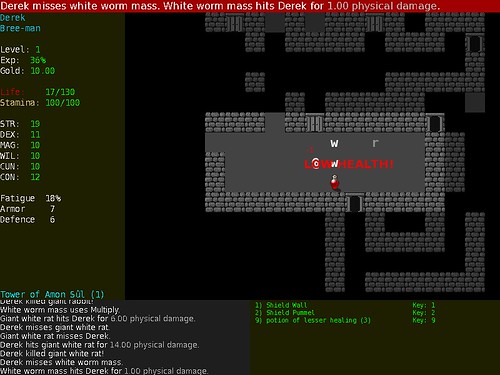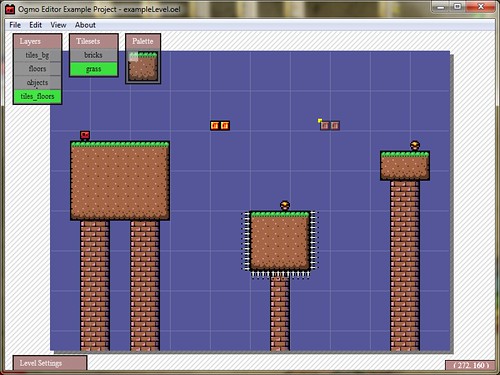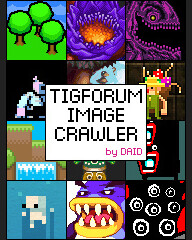Posts from ‘Developers’ Category
A Game By Its Cover (competition)
By: Paul Eres
On: June 28th, 2010
This competition is being organized by Melly. The idea is to take some fake box art that someone else did (there are links to such collections in the thread) and realize that game. Deadline is July 31.
IndieDB
By: Derek Yu
On: June 18th, 2010
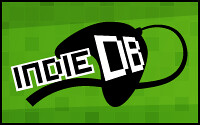
Say hello to ModDB‘s new indie brother! Its name is IndieDB, and it’s a developer/player run website that’s dedicated to indie games. The site is launching with a number of new features, including design tweaks, better search, and faster speed. Accounts on ModDB and Desura (a digital distribution services for games and mods) will work with IndieDB, since they’re all by the same creators.
You Meet the Nicest People Making Videogames
By: Paul Eres
On: June 11th, 2010
You Meet the Nicest People Making Videogames was actually a Kickstarter project before Indie Game the Movie was but wasn’t funded on its first attempt. While that one focuses on more well-known indies, this one focuses on more offbeat ones, like Gregory Weir and Amon26 (All Your Friends Are Dead). You can even see Daphaknee briefly in the video above, behind Anna Anthropy. Hopefully the movie will interview her too.
I’m sure both this one and Indie Game the Movie will be fun to watch when they are finished. In an attempt to get this one made I’m posting this up here and going to be contributing myself after this is posted. You can see a breakdown of what they intend to use the money for on their tumblr.
Michał Marcinkowski: Why We Need Emotions
By: Derek Yu
On: June 6th, 2010
I’ll be honest, when I read the title I thought Michał was trolling art games again, but it’s a real talk! The talk is about having the right motivations to carry out your dreams and move the world. It was given at TEDxWulkan (Polish for “Volcano”), where the theme was “It’s impossible. But it’s doable.” There are no big secrets revealed here, but I always enjoy Michał’s colorful analogies. Developers who are in a rut may find this inspiring!
Michał is the creator of Soldat and is currently working on a new game called Link-Dead (which, by the way, has a new artist, Victor Rojo).
ToME 4 and T-Engine4 (Beta)
By: Derek Yu
On: May 15th, 2010
Tales of Middle-Earth, a roguelike more commonly known as ToME, has come out of its hobbit’s hole after a multiple-year hiatus. What’s really exciting about ToME 4’s release is that it comes with T-Engine4, an open-source, Lua-based roguelike engine. In fact, ToME 4 is simply included as a module for the engine. According to DarkGod, the game’s creator:
Among its features, T-Engine4 has a single, unified user interface using OpenGL on all platforms, keyboard and mouse support, generic save and load using serialization, and support for both a graphical (tile-based) mode and traditional ASCII (potentially at the same time). Developers interested in creating their own roguelike should check this engine out. See DarkGod’s original announcement for more information.
TIGdb: Entry for Tales of Middle-Earth
(Source: Slash, via Temple of the Roguelike)
IGS 2010: Fantastic Contraption Postmortem
By: Brandon McCartin (BMcC)
On: April 16th, 2010

Colin Northway Speaks, Has Beard (photo by Chrissy “Nava” Chubala)
Colin Northway gave a fairly business-oriented postmortem of his game Fantastic Contraption at this year’s Independent Games Summit called (no big surprise here) Postmortem: The Design & Business Behind Fantastic Contraption. He had actually given this talk previously at the last GDC Austin, so I can link you to Brandon Boyer’s detailed Offworld coverage of that session rather than typing up all these darn notes myself! In short: Flash is good, Box2D is great, and anyone can create and publish a successful game all by themselves. (Though, backup from Andy Moore certainly doesn’t hurt!)
Okay, it was a bit more in depth than that. Read on, if you dare!
Fantastic Contraption was conceived one night when Colin awoke and scribbled down a note beginning with “Cool Shit Idea.” The majority of the game was done within a few weeks, using only notepad and a command line compiler. A bunch of user (i.e., family) testing and website work later, the game was released. After going away for a weekend, Colin returned to find the game had blown up on StumbleUpon, crushing the servers. “It was a good problem to have, but there are no good problems, only problems.” Needless to say, the game quickly became a success. Andy Moore was soon brought in to manage the rapidly growing fan community.
Apart from the stats and such, what I really took away from this talk were some great messages for independent (and wannabe independent) game developers in general. Colin built a solid game that seemed to perpetuate itself, putting no resources into press, portals, publishers, ads, or anything. Here are some of the more quotable quotes:
“Box2D is the Fire Flower of game development.” (He even kicked back some of the profit from the game to Erin Catto, which is awesome.)
“Money is dumb and lonely and just wants to be with other money.” Once the game took off, people started coming to him. But “pay attention to the slime factor” when dealing with the business end of things. (Colin was at one point offered a couple hundred bucks for the source of and full rights to the game.)
“Go into the wilderness” when deciding what to make, “make what you want, not what people say” — you will find success with your own creativity. Sometimes “everyone says no” but “you don’t need permission to make a really good game, or a successful one.” “There are no gatekeepers.” (This is my favorite!)
Embrace social networking; you don’t need to conquer it to use it. And “close the information gap, talk to other indies.”
Also, Colin casually said “fantastic” (outside the context of the game’s title) like fifty times. I wonder if he noticed. :)
All in all, pretty inspiring stuff!
IGS 2010: Abusing Your Players Just For Fun
By: Brandon McCartin (BMcC)
On: April 13th, 2010
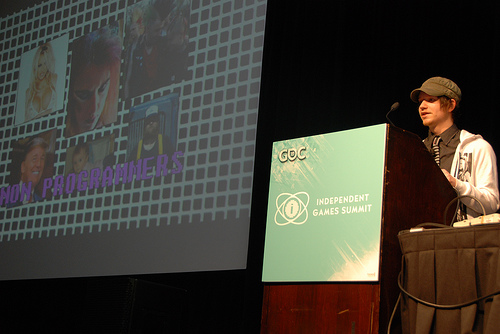
Photo by non-programmer Rebekah Saltsman
I was planning to simply summarize the various IGS sessions this year, but instead wrote up every single note I had for my previous post. Today I shall exercise some restraint!
IGF Nuovo Award winner and indie mastermind Cactus’ first talk this year, Abusing Your Players Just For Fun, was ostensibly about designing games with obfuscated interactions, bizarre themes, trippy visuals, a high level of difficulty— the kind of stuff Cactus is known for— but really, to me, seemed more about encouraging people who would otherwise not develop games to try, about the desire to see an even greater variety of creative output from the indie games sphere. (I’m sure we’ve all wondered at some point what types of games Bowie might make! Or that baby.)
The session opened with a legitimate seizure warning (though, his talk last year was probably more dangerous in that regard) and, for the most part, he discussed various artists in other fields, like film and music, who bring a singular, unique creative vision to their work. He even stopped for a spell to show this scene from David Lynch’s Lost Highway.
But that’s not to say game designers didn’t get their due! Cactus went on to show the work of a few indies that inspire him, “punk rock” game developers as he called them: Matt “TheAnemic” Aldrige, creator of the surreal La La Land series of games (and most recently Uin); Mark “”http://messhof.com/news/" title=“Messhof’s Site”>Messhof" Essen, in particular his games Punishment, Flywrench, and Randy Balma: Municipal Abortionist; the multi-talented Jph Wacheski; and even Jon Blow. (He probably did, but I would also have to point to Stephen “”http://www.increpare.com/" title=“increpare games (Stephen Lavelle”>increpare" Lavelle and his ever growing portfolio of mind-bending works!)
If you’d like to read a description of the session by someone who, you know, actually knows how to write, I recommend this post Scott Sharkey made to his 1UP blog— he really nails it!
Ogmo Editor
By: Derek Yu
On: April 12th, 2010
Matt Thorson (Jumper, RunMan: Race Around the World) has released a general-purpose 2D tile editor called Ogmo Editor. It’s an Adobe® AIRâ„¢ application that works in Windows, OSX, and Unix, and exports tilemaps as an XML file or as a PNG. There’s a tutorial available to help you get started. Ogmo Editor is donationware.
Last year, Matt also released Grandma, a free platform engine for Game Maker that’s based on his Jumper 3 code. I’ll definitely be checking that one out at some point. Thanks, man!
IGS 2010: Indie Fund Explained
By: Brandon McCartin (BMcC)
On: March 26th, 2010

Photo courtesy of Rebekah Saltsman
The 2010 Independent Games Summit kicked off this year with a talk from Ron Carmel (of 2D Boy fame) called Indies and Publishers: Fixing a System that Never Worked, further clarifying the recently announced Indie Fund — a new investment/funding alternative created by successful indie developers for indie developers. The Fund has secretly been in action a while now, but is still not yet fully public, so this session bridged the gap somewhat between its reveal a few weeks ago and eventual open submissions.
I’ll summarize the talk (and the Q/A session) after the jump, but if you want all the details, plus high resolution versions of David Hellman‘s dope slides, head over to Brandon Boyer’s excellent article on Offworld (Boing Boing, whatever).
The Problem, as Ron put it, is mainstream publishers still treat indie development teams the same as they would any other. Old habits inherited from the retail days are still alive, not taking into account the streamlined, iterative way in which most indie games are made, nor their low budget. What this means is publishers wind up taking too big of a risk up front, and taking too much in return, effectively turning the independent developers into “tenant farmers.” Despite the fact that digital distribution means smaller games with zero manufacturing costs, and smaller teams that don’t need to make as much money, the system in place is largely unchanged from AAA game publishing. It’s generally inefficient and keeps the developer in the dark, but there isn’t a better alternative.
As an example, Ron described what he and Kyle went through trying to bring World of Goo to Games for Windows Live. The game got passed through lawyers, supervisors, engineers, QA teams, and various other managers for months and months before being approved. But when they brought the game to Steam (an admittedly more established service) the process took only a few days.
Ron defined publishing with an equation: Publishing = Funding + Distribution. But with the wide variety of distribution channels available to indies today, he concluded that traditional publishers aren’t needed at all. All that’s needed is funding. So the question became, “How do we do for publishing what Steam did for distribution?” The answer: Indie Fund.
He then went on to name some of the objectives of Indie Fund:
– A transparent, faster submission process
– A clear, publicly available deal
– A direct line of communication with the developer
– A flexible development setup for the developer
(no design docs, no milestones, just periodic builds with change lists)
– No IP ownership, no creative control over the developer
– No editorial work, putting trust in the developer
This concluded the talk. A brief Question and Answer session followed (which I will continue to heavily paraphrase):
Q: How big is the fund?
A: Size doesn’t matter. Finding the right games matters; the money will come.
Q: What about the role traditional publishers play in marketing?
A: It’s possible they help, but I haven’t seen conclusive evidence of them making a difference.
Q: When will the submission process open?
A: Currently it’s through word of mouth. We’re still ironing things out, waiting for results, etc.
Q: Are traditional publishers needed to reach all platforms?
A: We’re not handling that part of the business. But making one deal usually opens the door for others.
Q: Is Indie Fund similar to Y Combinator?
A: They seem to provide less funding and much earlier. Indie Fund will be more conservative at first, providing a significant amount of funding to more complete games.
Q: Will Indie Fund provide the developer with resources? Will you take royalties?
A: This isn’t our full time job. We won’t be doing these things. The developer should remain independent.
GDC 2010: Please Finish Your Game
By: Derek Yu
On: March 24th, 2010
The inimitable Chris Hecker ranted at GDC this year (Chris worked on Spore but is now indie). His rant, titled “Please Finish Your Game”, addresses the issue of development time in the mainstream and indie communities. Specifically, he asks developers to pursue good ideas to their “logical and aesthetic extent”.
Chris elaborates on his rant here, and has added an email exchange he had with cactus about it afterwards (cactus is featured prominently in the rant).

